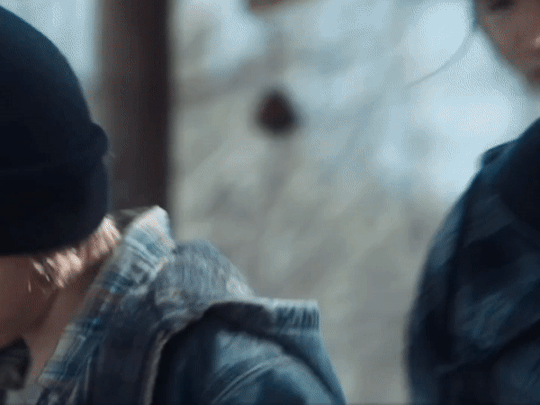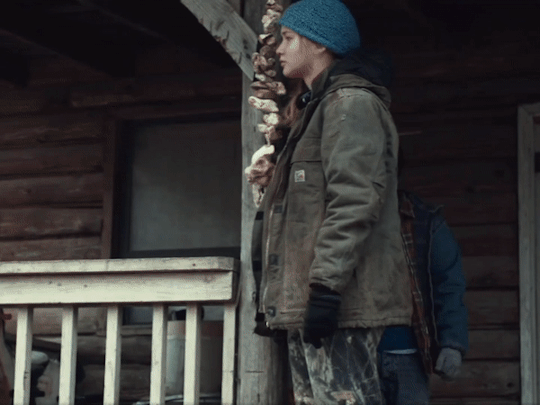#isaiah stone
Photo








Leave No Trace
2018 | dir. Debra Granik
#leave no trace#filmedit#debra granik#ben foster#thomasin mckenzie#dale dickey#isaiah stone#films#movies#faceless
218 notes
·
View notes
Text

Now showing on DuranDuranTulsa's Drama Filmhouse...Winter's Bone (2010) on classic DVD 📀! #movie #movies #drama #wintersbone #JenniferLawrence #JohnHawkes #isaiahstone #DVD #2010s #durandurantulsa #durandurantulsasdramafilmhouse
#movies#movie#drama#winter's bone#Jennifer Lawrence#john hawkes#isaiah stone#dvd#2010s#duran duran tulsa's drama filmhouse#duran duran tulsa
1 note
·
View note
Text

A Sign against Egypt and Ethiopia
1 In the year that Tartan came to Ashdod, (when Sargon the king of Assyria sent him,) and fought against Ashdod, and took it; 2 At the same time spoke the LORD by Isaiah the son of Amoz, saying, Go and loose the sackcloth from off your loins, and put off your shoe from your foot. And he did so, walking naked and barefoot. 3 And the LORD said, Like as my servant Isaiah has walked naked and barefoot three years for a sign and wonder on Egypt and on Ethiopia; 4 So shall the king of Assyria lead away the Egyptians prisoners, and the Ethiopians captives, young and old, naked and barefoot, even with their buttocks uncovered, to the shame of Egypt. 5 And they shall be afraid and ashamed of Ethiopia their expectation, and of Egypt their glory. 6 And the inhabitant of this isle shall say in that day, Behold, such is our expectation, where we flee for help to be delivered from the king of Assyria: and how shall we escape?
— Isaiah 20 | American King James Version (KJVUS)
The American King James Version is Produced by Stone Engelbrite. It is a simple word for modern word update from the King James English.
Cross References: Joshua 11:22; 1 Samuel 5:1; 2 Samuel 10:4; 2 Kings 18:21; Isaiah 8:18; Isaiah 18:1; Isaiah 19:4; Matthew 3:4; Matthew 23:33; Acts 21:11; 1 Corinthians 3:21; 1 Thessalonians 5:3
#The Lord#Isaiah#sign#meaning#Egypt#Ethiopia#message to Judah#Isaiah 20#Book of Isaiah#Old Testament#KJVUS#American King James Version Bible#Stone Engelbrite
12 notes
·
View notes
Quote
Behold, a king will reign righteously and princes will rule justly. Each will be like a refuge from the wind and a shelter form the storm, like streams of water in a dry country, like the shade of a huge rock in a parched land.
Isaiah 32:1-2 NASB (1995)
#bible verse#kings#rulers#government#prophecy#justice#righteousness#refuge#protection#safety#storms#drought#stones#isaiah 32#new american standard bible
12 notes
·
View notes
Text
Passing Over to the Promise Land
Passing Over to the Promise Land
Isn’t it wonderful that the Lord suddenly opens the scriptures, pulling back a veil to show us more of Himself? For example, In Exodus 28 I read how the priest wore an onyx stone on each shoulder “to bear the names of God’s people as a memorial before the LORD.”
(Exodus 28:11-12)
Onyx Stone on the shoulder of the High Priest
Inscribed on each stone were six…
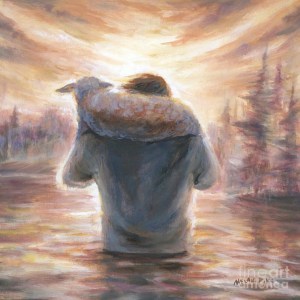
View On WordPress
#Christian Paintings in Catacomgs#Crossing the Jordan River#Inscribed in the Lamb&039;s Book of Life#Isaiah 40:11#Isiah 49:15#Jesus Carries us into the Promise Land#Jew and Gentile United#Memorial Stones of God&039;s Faithfulness#On Jesus&039; Shoulders#Onyx Stone#The Cross is a Positive Sign
0 notes
Text

#the sword in the stone#the vision#the riddle#isaiah 29:11#daily bread#nightly bread#god is love#bible
0 notes
Text
Isaiah 42: Blind and Deaf, Blessed and Beloved
After speaking of God’s Covenant Servant, Isaiah now turned to a different kind of servant. servant. First, the prophet described what was wrong.
#Isaiah42 #BlindandDeafServant #TheChurch
After speaking of God’s Covenant Servant, Isaiah now turned to a different kind of servant. servant. First, the prophet described what was wrong.
Blind and Deaf Servant
This servant was blind to the calling God had placed in their lives
Listen, you who are deaf, and you who are blind, look up and see!Who is blind but my servant or deaf like my messenger whom I send?Who is blind like my…
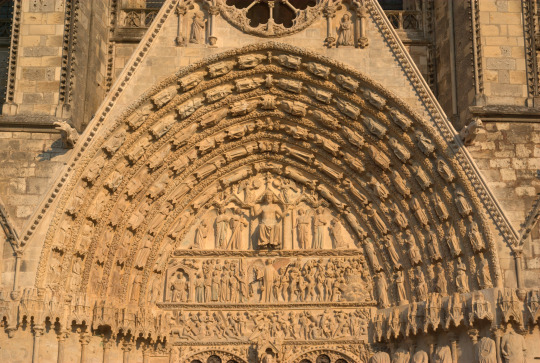
View On WordPress
#blind and deaf servant#Blind servant#bride of christ#christ&039;s bride#company of god&039;s redeemed#god&039;s temple#invisible church#isaiah 42#Isaiah 42-43#Isaiah 43#temple of christ#temple of living stones#the church#visible and invisible church#visible church
0 notes
Text
Gabriel’s (missing) cross
Let’s put everything we know about that spooky statue of the Archangel Gabriel in one thread to make the conversation about its possible meaning as a Good Omens 3 clue more structured. Starting off with the relevant part of the official commentary from X-Ray:
Douglas Mackinnon got one thing wrong in his part of the interview — Gabriel wasn’t carved by “some guy in Italy,” but a British sculptor and prop maker David Field working as a part of the team at 3DEye in London.
Technically speaking, it’s a gorgeous piece of hand-carved expanded polystyrene with a clay sculpted head on top of it — even if the Archangel’s smug likeness isn’t that pleasant to look at, all things considered. The scenic artists from 3DEye made it look like stone afterwards.
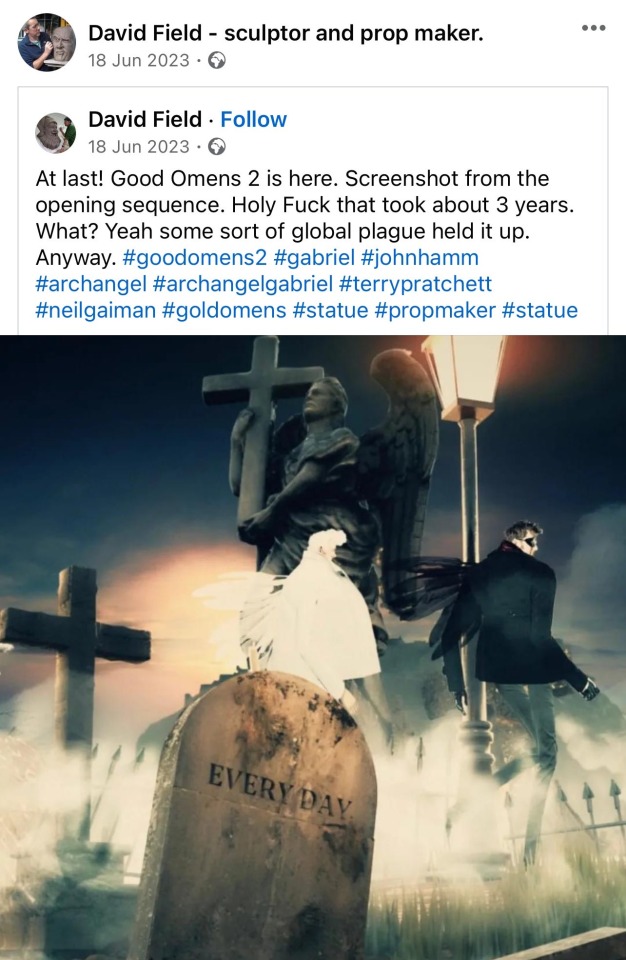
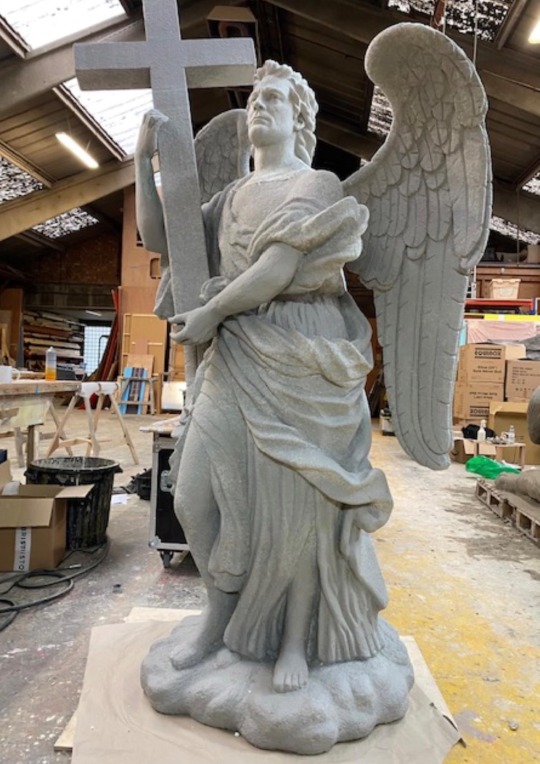
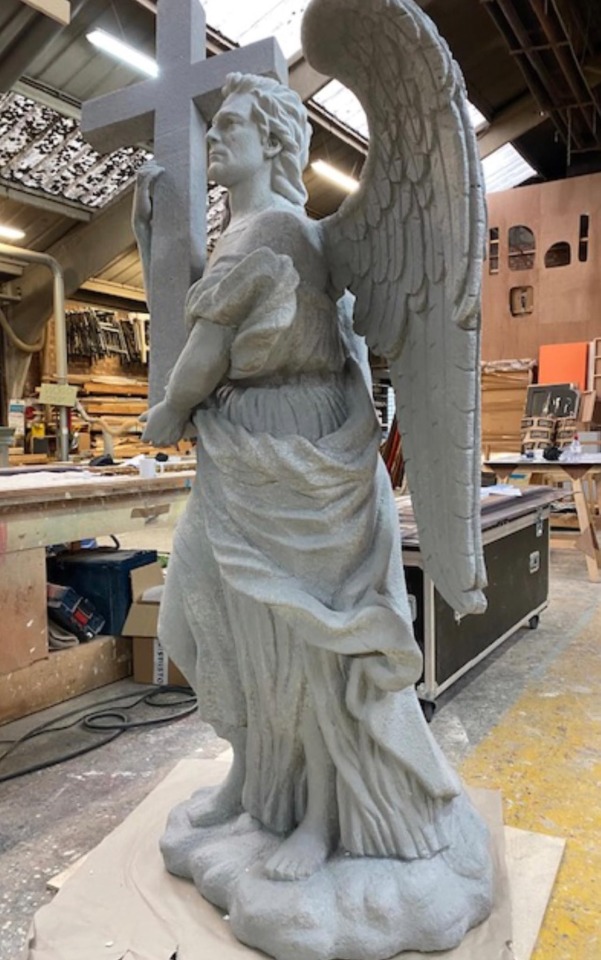
The body itself took ten days to sculpt and is a faithful copy of the famous statue on Ponte Sant'Angelo in Rome called Angel with the Cross by Ercole Ferrata. It stands on the inscription “Cuius principatus super humerum eius” (“Whose government shall be upon His shoulder”, Isaiah 9:16), and this quote makes much more sense for Gabriel than the cross in his hands. The usual iconography of the Archangel uses a trumpet or a white lily instead.
Ponte Sant'Angelo was originally used to expose the heads of those sentenced to death — each of the angelic statues on it carry Arma Christi, the Instruments of the Passion. Like the Second Coming, what seems to be a hopeful message to the Chosen Ones can also be a warning for the others.
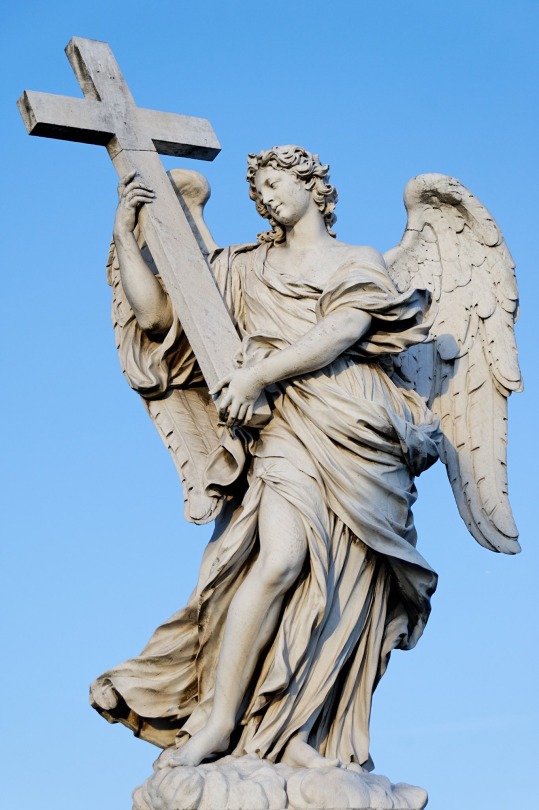
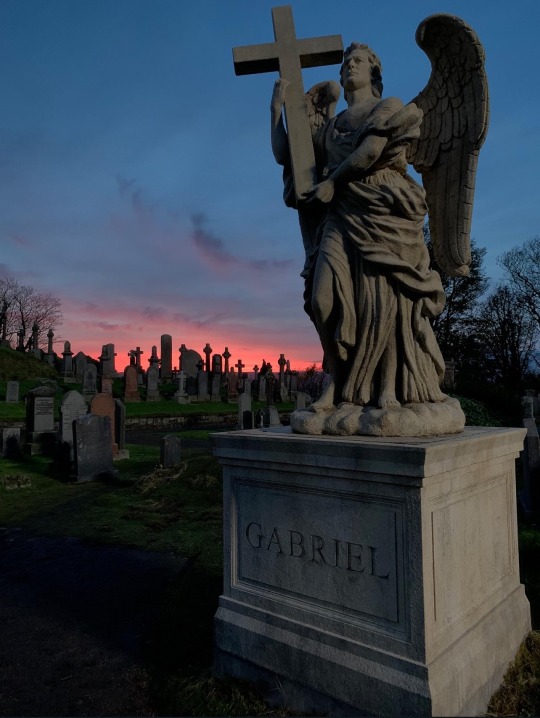
The statue of Gabriel, first shown in full in the cemetery scene of the Good Omens 2 title sequence, reappears at the very end as a part of the bridge leading to the biggest Easter egg — at least according to Peter Anderson, the animator behind it — which is the lift in the background, implying how we’re getting closer towards the Second Coming. Notice how the cross broke down in half at some point between these two scenes!
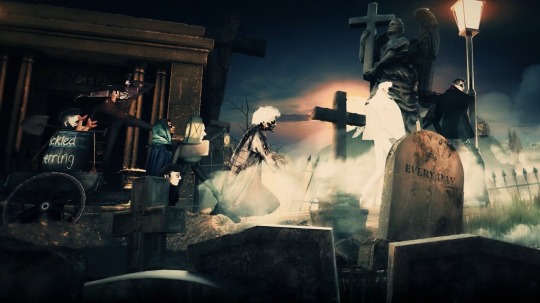
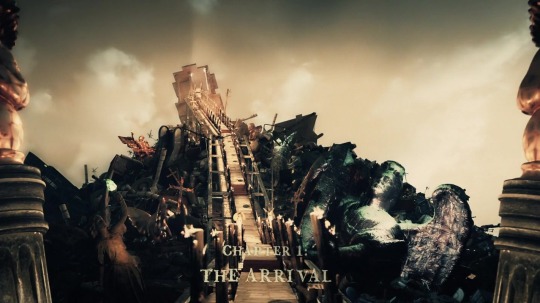
And it disappears in the plot as well: Gabriel’s memory depicts it only from his point of view, with the camera deliberately moving slightly to the right and stopping at his eye level. The centered, establishing shots show the statue with empty hands as a bookend.
I believe that this cross is meant to serve as a foreshadowing, a reminder of the absolution of sins and eternal life through Christ’s sacrifice and Second Coming. We see it only through Gabriel and Aziraphale’s eyes — when Beelzebub looks at the statue, the cross is not there.
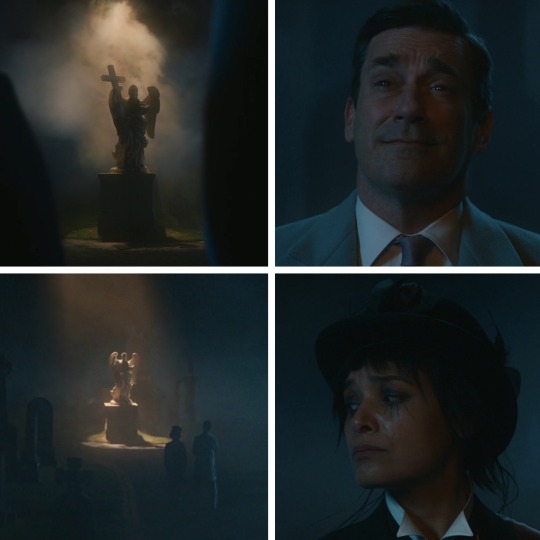
As seen in the BTS photos and videos, it’s not an editing error, but a deliberate positioning of the physical props on set. The cross was clearly meant to be a removable part of the statue and displayed in a specific way to convey a message to the audience.
The question remains: is it a reassurance, something to look forward to, or maybe rather a warning?
Not helpfully at all, the traditional use of angelic imagery in Christian cemeteries matches both interpretations.
#everything has a meaning#the good omens crew is unhinged#good omens props#archangel fucking gabriel#gabriel’s statue#good omens#good omens meta#yuri is doing her thing
788 notes
·
View notes
Text
I finished the novel Halo: The Rubicon Protocol. I loved it. One of the few novels where I genuinely care about what happened to the main characters.

#Halo#Halo: The Rubicon Protocol#The boat crew#Nina Kovan#Bonita Stone#Tomas Horvath#Hudson Griffin#TJ Murphy#Isaiah Cameron#Erik Bender#Gavin Jo#Robin Dimik
1 note
·
View note
Note
#4 sounds like white people at the end of slavery… “we didn’t want to end it because what if there’s retaliation? There have already been slave riots. Imagine what would happen if we gave them freedom or if we became the minority?” It’s not speculative it actually happened the fears had basis. That’s what number four sounds like. It also feels like you only care about one view point like you expect me to believe y’all are perfect victims that did one thing in retaliation?
#4 sounds like that to you because you are an American who thinks the whole world is America and all history must be the same as yours. So you should start by asking yourself what it is in your cultural upbringing, and what in the media you consume, that has you automatically believing the worst possible claims against Jews, to the point of seeing it as understandable for us to be mass murdered.
Jews did not - and do not - want to live in an Arab or Muslim majority society not because of any issues related to "slave uprisings" you are teleporting into this discussion, but rather because Jews had already been brutally oppressed, persecuted, and genocided by Arabs and Muslims for 1,000+ years before Israel or political Zionism were ever invented. Mohammed himself got his hands dirty with this, wiping out the Jews of Yathrib and renaming the gore-drenched rubble into something called "Medina." No less a source than Maimonides wrote in 1172 "God has entangled us with this people, the nation of Ishmael, who treat us so prejudicially and who legislate our harm and hatred…. No nation has ever arisen more harmful than they, nor has anyone done more to humiliate us, degrade us, and consolidate hatred against us... We bear the inhumane burden of their humiliation, lies and absurdities, being as the prophet said, ‘like a deaf man who does not hear or a dumb man who does not open his mouth’.... Our sages disciplined us to bear Ishmael’s lies and absurdities, listening in silence, and we have trained ourselves, old and young, to endure their humiliation, as Isaiah said, ‘I have given my back to the smiters, and my cheek to the beard pullers.’”
Because there is a long history of this, there is much you can read about it, if you care.
Some very random examples:
The "badge of shame" was invented in medieval Baghdad, only later migrating to Europe
Life for Jews in Yemen: The Jews of Yemen were treated as pariah, third-class citizens who needed to be perennially reminded of their submission to the ruling faith…The Jews were considered to be impure, and therefore forbidden to touch a Muslim or a Muslim’s food. They were obliged to humble themselves before a Muslim, to walk on his left side, and to greet him first. They were forbidden to raise their voices in front of a Muslim. They could not build their houses higher than the Muslims’ or ride a camel or horse, and when riding on a mule or donkey, they had to sit sideways. Upon entering a Muslim quarter, a Jew had to take off his footgear and walk barefoot. No Jewish man was permitted to wear a turban or carry the Jambiyyah (dagger), which was worn universally by the free tribesmen of Yemen. If attacked with stones or fist by Islamic youth, a Jew was not allowed to defend himself. Further, the Jews were forced to wear sidelocks or peots. The wearing of such long and dangling peots “was originally a source of great shame for the Yemenites. It was decreed by the imams to distinguish the Jews from the Muslims”. More degrading and insulting decrees to the Jews were the Atarot (Headgear) and Latrine Decrees. The former was a seventeenth-century decree forbidding the Jews to wear a headcovering or turbans. The Latrine Decree was a nineteenth-century edict in which the Jews were forced to clean out public toilets and remove animal dung and carcasses from the streets. Another discriminatory edict was the Orphan Decree which gave the Zaydis the right to convert to Islam any child under the age of thirteen whose father is dead. Further, evidence by a Jew against a Muslim was invalid and a “Jew was forbidden to pass a Muslim to his right, and whoever did so, even unwittingly, could be beaten without trial; the Jews were forbidden to make their purchases before the Muslims had completed theirs; a Jew entering the house of an Arab or the office of an official was only allowed to sit down in the place where the shoes were removed” . Tudor Parfitt summarizes some of these laws in the following: [the Jews] were required not to insult Islam, never strike a Muslim, or to impede him in his path. They were not to assist each other in any activity against a Muslim…They were not to build new places of worship or repair existing one…They were not to pray too noisily or hold public religious processions. They were not to wink. They were not to proselytize. They were not to bear arms. They were required to dress in a distinctive fashion in order not to be mistaken for a member of the Muslim occupying forces. In other words dhimmis had all the times to behave themselves in an unostentatious and unthreatening manner, one appropriate to a defeated and humbled subject people. They were to avoid the slightest show of triumphalism and they were forbidden any activity that could lead to proselytization. Yemenite Jews were “excluded as it almost always…from affairs of state, and from the great institutions of the country”
1941 Farhud pogrom (Iraq)
1929 Hebron Massacre ("They cut off hands, they cut off fingers, they held heads over a stove, they gouged out eyes. A rabbi stood immobile, commending the souls of his Jews to God – they scalped him. They made off with his brains. On Mrs. Sokolov’s lap, one after the other, they sat six students from the yeshiva and, with her still alive, slit their throats. They mutilated the men. They shoved thirteen-year-old girls, mothers, and grandmothers into the blood and raped them in unison....")
1921 Jaffa Riots
1920 Nebi Musa Riots
1910 Shiraz Blood Libel (Iran) ("In the middle of the 19th century, J. J. Benjamin wrote about the life of Persian Jews: "…they are obliged to live in a separate part of town…; for they are considered as unclean creatures… Under the pretext of their being unclean, they are treated with the greatest severity and should they enter a street, inhabited by Mussulmans, they are pelted by the boys and mobs with stones and dirt… For the same reason, they are prohibited to go out when it rains; for it is said the rain would wash dirt off them, which would sully the feet of the Mussulmans… If a Jew is recognized as such in the streets, he is subjected to the greatest insults. The passers-by spit in his face, and sometimes beat him… unmercifully… If a Jew enters a shop for anything, he is forbidden to inspect the goods… Should his hand incautiously touch the goods, he must take them at any price the seller chooses to ask for them... Sometimes the Iranians intrude into the dwellings of the Jews and take possession of whatever please them. Should the owner make the least opposition in defense of his property, he incurs the danger of atoning for it with his life... If... a Jew shows himself in the street during the three days of the Katel (the start of Muharram)…, he is sure to be murdered")
1840 Damascus Blood Libel (Syria)
1839 Allahdad Pogrom (Iran)
1834 Hebron Massacre
1834 Looting of Safed
1700 Jerusalem oppression / apartheid: ("Muslims are very hostile to Jews and inflict upon them vexations in the streets of the city… the common folk persecute the Jews, for we are forbidden to defend ourselves against the Turks or the Arabs. If an Arab strikes a Jew, he (the Jew) must appease him but dare not rebuke him, for fear that he may be struck even harder, which they (the Arabs) do without the slightest scruple...")
1679 Mawza Exile (Yemen)
1660 Destruction of Safed
1500s Iran: ("After the ascension of Shah ‘Abbas II the Jews of Isfahan faced a lot of persecution. Most communities were forced to convert to Islam. Furthermore those who refused to convert would have most of their inheritance taken away as the inheritance laws at the time allowed for those who converted to Shia Islam to inherit the property of non-Muslim family members. Some communities did not convert and were thus forced to wear a special badge to show that they were Jewish. The maltreatment of the Jews weakened their community ties and influence throughout the region. By 1889 there were only around four hundred Jewish families left in Isfahan and most very poor.... by the middle 20th century 80% of the Jews of Isfahan lived on the verge of poverty.")
There's so much more I really don't know where to start or where to end. Afghanistan revoked all Jewish citizenship in 1933. Turkey banned all Jewish names and held massive antisemitic pogroms in 1934. Iraq banned Hebrew schools and Hebrew names in 1936, pogroms throughout Libya 1945, Syria fired all Jewish government employees 1946. Tripoli pogrom 1785. Algiers 1805. Cairo 1844. Istanbul 1870. Safed 1517 and 1799. Jerusalem 1665 and 1720. Granada Massacre 1066. Fez Massacre 1033. How many Wiki links do you want, how many textbooks?
This is an old, old conflict, and the Americanized "colonizer / slave plantation" frame is off-topic.
469 notes
·
View notes
Note
For a school assignment, I'm assembling an anthology around the theme of queer divinity and desire, but I'm having a hard time finding a fitting essay/article (no access to real academic catalogues :/ ), do you know of any essays around this theme?
below are essays, and then books, on queer theory (in which 'queer' has a different connotation than in regular speech) in the hebrew bible/ancient near east. if there is a particular prophet you want more of, or a particular topic (ištar, or penetration, or appetites), or if you want a pdf of anything, please let me know.
essays: Boer, Roland. “Too Many Dicks at the Writing Desk, or How to Organize a Prophetic Sausage-Fest.” TS 16, no. 1 (2010b): 95–108. Boer, Roland. “Yahweh as Top: A Lost Targum.” In Queer Commentary and the Hebrew Bible, edited by Ken Stone, 75–105. JSOTSup 334. Cleveland, OH: Pilgrim, 2001. Boyarin, Daniel. “Are There Any Jews in ‘The History of Sexuality’?” Journal of the History of Sexuality 5, no. 3 (1995): 333–55. Clines, David J. A. “He-Prophets: Masculinity as a Problem for the Hebrew Prophets and Their Interpreters.” In Sense and Sensitivity: Essays on Reading the Bible in Memory of Robert Carroll, edited by Robert P. Carroll, Alastair G. Hunter, and Philip R. Davies, 311–27. JSOTSup 348. Sheffield: Sheffield Academic Press, 2002. Graybill, Rhiannon. “Yahweh as Maternal Vampire in Second Isaiah: Reading from Violence to Fluid Possibility with Luce Irigaray.” Journal of feminist studies in religion 33, no. 1 (2017): 9–25. Haddox, Susan E. “Engaging Images in the Prophets: Feminist Scholarship on the Book of the Twelve.” In Feminist Interpretation of the Hebrew Bible in Retrospect. 1. Biblical Books, edited by Susanne Scholz, 170–91. RRBS 5. Sheffield: Sheffield Phoenix Press, 2013. Koch, Timothy R. “Cruising as Methodology: Homoeroticism and the Scriptures.” In Queer Commentary and the Hebrew Bible, edited by Ken Stone, 169–80. JSOTSup 334. Cleveland, OH: Pilgrim, 2001. Tigay, Jeffrey. “‘ Heavy of Mouth’ and ‘Heavy of Tongue’: On Moses’ Speech Difficulty.” BASOR, no. 231 (October 1978): 57–67.
books: Ahmed, Sara. Queer Phenomenology: Orientations, Objects, Others. Durham, NC: Duke University Press, 2006. Bauer-Levesque, Angela. Gender in the Book of Jeremiah: A Feminist-Literary Reading. SiBL 5. New York: P. Lang, 1999. Black, Fiona C., and Jennifer L. Koosed, eds. Reading with Feeling : Affect Theory and the Bible. Atlanta, GA: SBL Press, 2019. Brenner, Athalya. The Intercourse of Knowledge: On Gendering Desire and “Sexuality” in the Hebrew Bible. BIS 26. Leiden: Brill, 1997. Camp, Claudia V. Wise, Strange, and Holy: The Strange Woman and the Making of the Bible. JSOTSup 320. Gender, Culture, Theory 9. Sheffield: Sheffield Academic Press, 2000. Chapman, Cynthia R. The Gendered Language of Warfare in the Israelite-Assyrian Encounter. HSM 62. Winona Lake, IN: Eisenbrauns, 2004. Creangă, Ovidiu, ed. Men and Masculinity in the Hebrew Bible and Beyond. BMW 33. Sheffield: Sheffield Phoenix Press, 2010. Eilberg-Schwartz, Howard. God’s Phallus: And Other Problems for Men and Monotheism. Boston: Beacon, 1995. Huber, Lynn R., and Rhiannon Graybill, eds. The Bible, Gender, and Sexuality : Critical Readings. London, UK ; T&T Clark, 2021. Guest, Deryn. When Deborah Met Jael: Lesbian Biblical Hermeneutics. London: SCM, 2005. Graybill, Rhiannon, Meredith Minister, and Beatrice J. W. Lawrence, eds. Rape Culture and Religious Studies : Critical and Pedagogical Engagements. Lanham, Maryland: Lexington Books, 2019. Graybill, Rhiannon. Are We Not Men? : Unstable Masculinity in the Hebrew Prophets. New York, NY: Oxford University Press USA, 2016. Halperin, David J. Seeking Ezekiel: Text and Psychology. University Park: Pennsylvania State University Press, 1993. Jennings, Theodore W. Jacob’s Wound: Homoerotic Narrative in the Literature of Ancient Israel. New York: Continuum, 2005. Macwilliam, Stuart. Queer Theory and the Prophetic Marriage Metaphor in the Hebrew Bible. BibleWorld. Sheffield and Oakville, CT: Equinox, 2011. Maier, Christl. Daughter Zion, Mother Zion: Gender, Space, and the Sacred in Ancient Israel. Minneapolis, MN: Fortress, 2008. Mills, Mary E. Alterity, Pain, and Suffering in Isaiah, Jeremiah, and Ezekiel. LHB/OTS 479. New York: T. & T. Clark, 2007. Stökl, Jonathan, and Corrine L. Carvalho. Prophets Male and Female: Gender and Prophecy in the Hebrew Bible, the Eastern Mediterranean, and the Ancient Near East. AIL 15. Atlanta, GA: SBL, 2013. Stone, Ken. Practicing Safer Texts: Food, Sex and Bible in Queer Perspective. Queering Theology Series. London: T & T Clark International, 2004. Weems, Renita J. Battered Love: Marriage, Sex, and Violence in the Hebrew Prophets. OBT. Minneapolis, MN: Fortress, 1995.
85 notes
·
View notes
Text
Bible Verses About Witchcraft
1 Chronicles 10:13- Saul died for his unfaithfulness to the Lord because he did not keep the Lord's word He even consulted a medium for guidance.
1 Samuel 15:23- For rebellion is like the sin of divination, and defiance is like wickedness and idolatry. Because you have rejected the word of the Lord, he has rejected you as king.
1 Samuel 22:23- Stay with me. Don't be afraid, for the one who wants to take my life wants to take your life. You will be safe with me.
2 Chronicles 33:6- He passed his sons through the fire in Ben Hinnom Valley. He practiced witchcraft, divination, and sorcery, and consulted mediums and spiritists. He did a huge amount of evil in the Lord's sight, angering him.
Leviticus 19:31- Do not turn to mediums, or consult spiritists, or you will be defiled by them, I am the Lord your God.
Leviticus 20:6- Whoever turns to mediums or spiritists and prostitutes' himself with them, I will turn against that person and cut him off from his people.
Leviticus 20:27- A man or a woman who is a medium or a spiritists must be put to death. They are to be stoned; their death is their own fault.
Revelation 18:23- The light of a lamp will never shine in you again and the voice of a groom and bride will never be heard in you again. All this will happen because your merchants were the nobility of the earth, because all the nations were deceived by your sorcery.
Revelation 21:8- But the cowards, faithless, detestable, murderers, sorcerers, idolaters, and all liars, their share will be in the lake that burns with fire and sulfur, which is the second death.
Galatians 5:19-20- Now the works of the flesh are obvious: sexual immorality, moral impurity, promiscuity, idolatry, sorcery, hatreds, strife, jealousy, outbursts of anger, selfish ambitions, dissensions, factions.
Galatians 5:19-21- Now the works of the flesh are obvious: sexual immorality, moral impurity, promiscuity, idolatry, sorcery, hatreds, strife, jealousy, outbursts of anger, selfish ambitions, dissensions, factions, envy, drunkenness, carousing and anything similar. I am warning you about these things, as I warned you before, that those who practice such things will not inherit the kingdom of God.
Micha 5:10-12- In that day, this is the Lord's declaration, I will remove your horses from you and wreck your chariots. I will remove the cities of your land and tear down all your fortresses. I will remove sorceries from your hands, and you will not have any more fortune tellers.
Acts 19:17-20- When this became known to everyone who lived in Ephesus, both Jews and Greeks, they became afraid, and the name of the Lord Jesus was held in high esteem. And many who had become believers came confessing and disclosing their practices, while many of those who had practiced magic collected their books and burned them in front of everyone. So they calculated their value and found it to be fifty thousand pieces of silver, in this way the word of the Lord flourished and prevailed.
Isaiah 8:19-22- When they say to you, "Inquire of the mediums and the spiritists who chirp and mutter, shouldn't a people inquire of their God? Should they inquire of the dead, on behalf of the living? Go to God's instruction and testimony! If they do not speak according to this word, there will be no dawn for them. They will wander through the land, dejected and hungry. When they are famished, they will become enraged, and looking upward, will curse their king and their God. They will look toward the earth and see only distress, darkness, and the gloom of affliction, and they will be driven into thick darkness.
Isaiah 19: 1-4- A pronouncement concerning Egypt: Look, the Lord rides on a swift cloud and is coming to Egypt. Egypt's idols will tremble before him, and Egypt will loose heart. I will provoke Egyptians against Egyptians, each will fight against his brother and each against his friend, city against city, kingdom against kingdom. Egypt's spirit will be disturbed within it, and I will frustrate it's plans. Then they will inquire of idols, ghosts, and spiritists. I will hand over Egypt to harsh masters, and a strong king will rule it. This is the declaration of the Lord of Armies.
Acts 8:9-13- A man named Simon had previously practiced sorcery in that city and amazed the Samaritan people, while calming to be somebody great. They all paid attention to him, from the least to the greatest and they said, "This man is called the Great Power of God". They were attentive to him because he had amazed them with his sorceries for a long time, but when they believed Philip, as he proclaimed
Deuteronomy 18:10-14- No one among you is to sacrifice his son or daughter in the fire, practice divination, tell fortunes, interpret omens, practice sorcery, cast spells, consult a medium or spiritists, or inquire of the dead. Everyone who does these acts is detestable to the Lord, and the Lord your God is driving out the nations before you because of these detestable acts. You must be blameless before the Lord your God. Though these nations you are about to drive out listen to fortune-tellers and diviners, the Lord your God has not permitted you to do this.
Isaiah 47: 8-14- So now hear this, lover of luxury, who sits securely, who says to herself, I am, and there is no one else. I will never be a widow or know the loss of children. These two things will happen to you suddenly, in one day, loss of children and widowhood. They will happen to you in their entirety, in spite of your many sorceries and potency of your spells. You were secure in your wickedness, you said No one sees me. Your wisdom and knowledge led astray. You said it yourself, I am, and there is no one else. But disaster will happen to you, you will not know how to avert it. And it will fall on you, but you will be unable to ward it off . Devastation will happen to you suddenly and unexpectedly. So take your stand with your spells and your many sorceries, which you have wearied yourself with from your youth. Perhaps you will be able to succeed, perhaps you will inspire terror! You are worn out with your many consultations. So let the astrologers stand and save you, those who observe the stars, those predict monthly what will happen to you. Look, they are like stubble, fire burns them. They cannot rescue themselves from the power of the flame. This is not a coal for warming themselves, or a fire to sit beside!
65 notes
·
View notes
Photo

Isaiah's Vision of the Lord in His Glory
1 In the year that king Uzziah died I saw also the LORD sitting on a throne, high and lifted up, and his train filled the temple. 2 Above it stood the seraphim: each one had six wings; with two he covered his face, and with two he covered his feet, and with two he did fly.
3 And one cried to another, and said, Holy, holy, holy, is the LORD of hosts: the whole earth is full of his glory.
4 And the posts of the door moved at the voice of him that cried, and the house was filled with smoke.
5 Then said I, Woe is me! for I am undone; because I am a man of unclean lips, and I dwell in the middle of a people of unclean lips: for my eyes have seen the King, the LORD of hosts.
6 Then flew one of the seraphim to me, having a live coal in his hand, which he had taken with the tongs from off the altar: 7And he laid it on my mouth, and said, See, this has touched your lips; and your iniquity is taken away, and your sin purged.
Isaiah's Commission
8 Also I heard the voice of the Lord, saying, Whom shall I send, and who will go for us? Then said I, Here am I; send me.
9 And he said, Go, and tell this people, Hear you indeed, but understand not; and see you indeed, but perceive not.
10 Make the heart of this people fat, and make their ears heavy, and shut their eyes; lest they see with their eyes, and hear with their ears, and understand with their heart, and convert, and be healed.
11 Then said I, Lord, how long? And he answered, Until the cities be wasted without inhabitant, and the houses without man, and the land be utterly desolate,
12 And the LORD have removed men far away, and there be a great forsaking in the middle of the land.
13 But yet in it shall be a tenth, and it shall return, and shall be eaten: as a teil tree, and as an oak, whose substance is in them, when they cast their leaves: so the holy seed shall be the substance thereof.
— Isaiah 6 | American King James Version (KJVUS)
The American King James Version is Produced by Stone Engelbrite. It is a simple word for modern word update from the King James English.
Cross References: Exodus 5:8; Exodus 15:11; Exodus 41:16; Leviticus 26:31; Numbers 14:21; Numbers 16:46; Deuteronomy 7:6; Deuteronomy 28:64; Ezra 9:2; Psalm 79:5; Isaiah 5:9; Isaiah 6:6; Isaiah 40:2; Matthew 13:14-15; Mark 4:12; Luke 5:8; John 12:40-41; Acts 9:4; Acts 26:19; 1 John 1:7; Revelation 4:2-3; Revelation 4:8; Revelation 8:3; Revelation 15:8
#Isaiah#vision#Lord#glory#Isaiah's commission#Isaiah 6#Book of Isaiah#Old Testament#KJVUS#American King James Version Bible#Stone Engelbrite
13 notes
·
View notes
Text







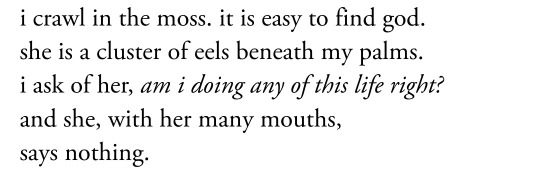
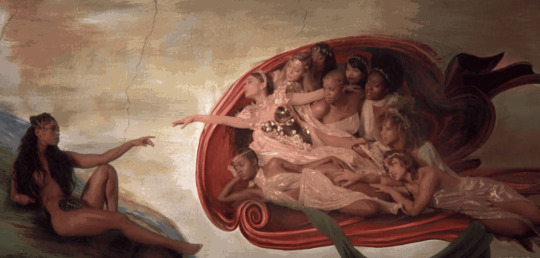
when all is said and done, you’ll believe god is a woman
i am not a woman, i am god, halsey / god as a mother, isaiah 49:15 / new amsterdam (2018) / when god was a woman, merlin stone / annunciation of a woman (2018), harmonia rosales / possession (1981) / churching, kristin chang / outbreaks, kitchen mckeown / god is a woman music video, dir. dave meyers
#literature#quotes#web weaving#feminine beauty#divine feminine#divinefemininity#god is a woman#god#poetry#ariana grande#new amsterdam#halsey#web weave#book quotes#lyrics#parallels#art parallels#literary parallels#art#harmonia rosales#possession#film stills
514 notes
·
View notes
